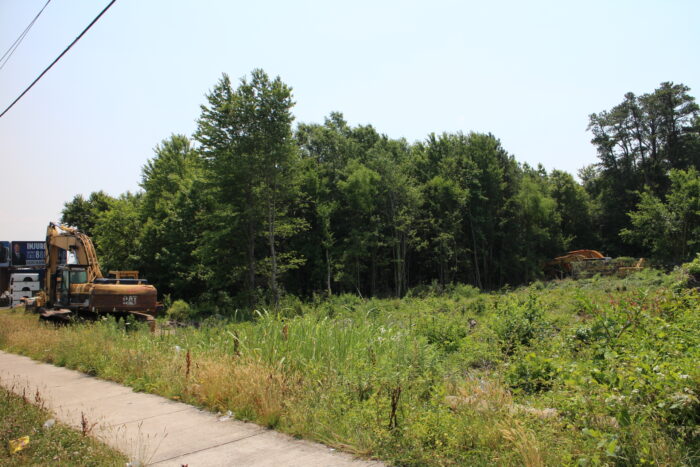
The 3.25-acre lot is under contract to be sold as plans are in the works for it to be developed. (Mike Platania photo)
A stretch of the Southside is being eyed for dozens of income-based apartments.
Massachusetts-based Dakota Partners is planning a 124-unit development at 6417 Midlothian Turnpike.
Dubbed The Maverick, the development would span two five-story buildings and rise on a 3.25-acre vacant lot across from Mexican restaurant Abuelita’s.
It would be Dakota’s second project in the Richmond region and its second on the Southside. Brady Square, a 264-unit affordable housing development, is taking shape at 2351 Krouse St.
Chris French, Dakota’s vice president of acquisitions and development, described The Maverick as workforce housing and said units at the new development would be available only to households earning between 30 and 60 percent of the area median income.
“Unfortunately, the reason we have such an affordable housing demand is incomes have gone up at a slow pace and expenses have shot through the roof,” French said. “We expect to have tenants that are nurses, police officers, teachers, firemen and folks getting out of college and starting their careers.”
The majority of the apartments at The Maverick would be two bedrooms, with 54 such units. Plans show the project would also have 40 one-bedroom units and 38 three-bedroom units. Dakota has enlisted local firm Moseley Architects to design the buildings.
“This’ll be all new-construction with a beautiful modern design. You won’t be able to tell the difference between (The Maverick) and any market rate (development) in the area,” French said.
He added that Dakota is under contract to purchase the land along Midlothian Turnpike; however, the firm has a number of municipal hurdles to clear before work on The Maverick can dig in.
Dakota has applied for a special-use permit from the City of Richmond, and has enlisted Roth Jackson’s Jennifer Mullen as its counsel in that process. The developers are also planning to seek Low-Income Housing Tax Credit funding, as well as other state and federal housing grants to help finance the project.
French said building affordable housing developments is both more expensive and complicated than market-rate apartments, noting that Dakota often spends between $300,000 and $350,000 per unit on its income-based deals.
“Some would say, ‘Why would you spend so much on construction if you can only charge so much in rent?” It’s because as a builder of affordable housing, you avail yourself of a multitude of subordinate funding sources that a market-rate deal doesn’t have,” French said, adding that another benefit to building affordable housing is that there’s always demand for it.
“We should have thousands and thousands and thousands of people waiting on a waitlist to go in there,” French said of The Maverick.
Dakota is aiming to line up all of its funding by the end of 2024 and begin construction of The Maverick in early 2025. French said they’re hoping by the time the project goes vertical, interest rates and construction costs will be more favorable for developers.
“You have to be very clever about how you do affordable housing development right now, and you have to be aware of every funding program that’s available,” he said.
“It’s a tough time for developers. You can either sit on the sidelines and do nothing, or you can push through.”

The 3.25-acre lot is under contract to be sold as plans are in the works for it to be developed. (Mike Platania photo)
A stretch of the Southside is being eyed for dozens of income-based apartments.
Massachusetts-based Dakota Partners is planning a 124-unit development at 6417 Midlothian Turnpike.
Dubbed The Maverick, the development would span two five-story buildings and rise on a 3.25-acre vacant lot across from Mexican restaurant Abuelita’s.
It would be Dakota’s second project in the Richmond region and its second on the Southside. Brady Square, a 264-unit affordable housing development, is taking shape at 2351 Krouse St.
Chris French, Dakota’s vice president of acquisitions and development, described The Maverick as workforce housing and said units at the new development would be available only to households earning between 30 and 60 percent of the area median income.
“Unfortunately, the reason we have such an affordable housing demand is incomes have gone up at a slow pace and expenses have shot through the roof,” French said. “We expect to have tenants that are nurses, police officers, teachers, firemen and folks getting out of college and starting their careers.”
The majority of the apartments at The Maverick would be two bedrooms, with 54 such units. Plans show the project would also have 40 one-bedroom units and 38 three-bedroom units. Dakota has enlisted local firm Moseley Architects to design the buildings.
“This’ll be all new-construction with a beautiful modern design. You won’t be able to tell the difference between (The Maverick) and any market rate (development) in the area,” French said.
He added that Dakota is under contract to purchase the land along Midlothian Turnpike; however, the firm has a number of municipal hurdles to clear before work on The Maverick can dig in.
Dakota has applied for a special-use permit from the City of Richmond, and has enlisted Roth Jackson’s Jennifer Mullen as its counsel in that process. The developers are also planning to seek Low-Income Housing Tax Credit funding, as well as other state and federal housing grants to help finance the project.
French said building affordable housing developments is both more expensive and complicated than market-rate apartments, noting that Dakota often spends between $300,000 and $350,000 per unit on its income-based deals.
“Some would say, ‘Why would you spend so much on construction if you can only charge so much in rent?” It’s because as a builder of affordable housing, you avail yourself of a multitude of subordinate funding sources that a market-rate deal doesn’t have,” French said, adding that another benefit to building affordable housing is that there’s always demand for it.
“We should have thousands and thousands and thousands of people waiting on a waitlist to go in there,” French said of The Maverick.
Dakota is aiming to line up all of its funding by the end of 2024 and begin construction of The Maverick in early 2025. French said they’re hoping by the time the project goes vertical, interest rates and construction costs will be more favorable for developers.
“You have to be very clever about how you do affordable housing development right now, and you have to be aware of every funding program that’s available,” he said.
“It’s a tough time for developers. You can either sit on the sidelines and do nothing, or you can push through.”




Market rate Class A apartments cost about $200k per door for the sticks and bricks. Affordable units run $300-350,000 per door? The lumber and concrete and drywall costs the same no matter where it is. Refrigerators cost no more in affordable units on Midlothian Turnpike than upscale units in Short Pump. Labor is the same. Generally speaking, the biggest cost difference between the affordable units and the Market rate ones lie in the land price, the amenity packages and the common areas. The land along that avenue will be less expensive than most areas, the amenities won’t be as lavishly… Read more »
He might be speaking broadly about all their projects when he gave his general per unit estimate. He didn’t say $300k per unit in Richmond specifically. They are based in Mass so they surely build in more expensive areas in the Northeast. Labor cost for one certainly are not the same in those areas as they are in Richmond.
Bruce has excellent points and I would add it is funny how many, many times the LMI or senior housing credit projects comes with higher per unit costs despite the subsidy assistance plus as he said fewer common area amenities. And I do love the developer speaking as if he is doing some special with this build. The LMI credit units aren’t supposed to be noticeable from your non-LMI units. Following the basic rules of the program is not special it is the law. And they are doing this to qualify for LIHTC credits as these types of rental properties… Read more »
Actually far less than half get funded. It’s closer to 20% and proximity to another one is one of the disqualifies.
Bruce, I think your post is a lot misleading. While I don’t think you’re incorrect about the approximately $200k per door for hard costs, I believe the developer was referring to his all-in cost when he referred to $300-350k per door. $300-350k per door “all-in” is about right. Also 9% LIHTC does not cover 90% of the total development costs. Projects are limited in the amount of credits they can request both by provisions within Virginia’s Qualified Allocation Plan (folks should read it to better understand affordable housing) as well as by the nature of the LIHTC application process. Virginia’s… Read more »
Thank you. You obviously are more well informed than me.